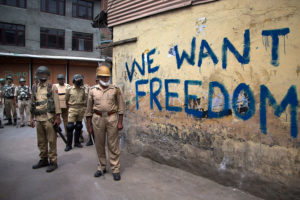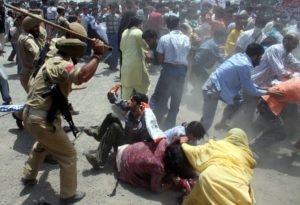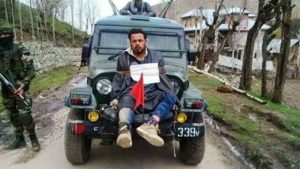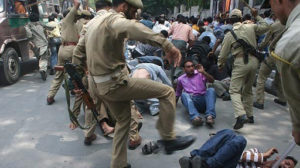Written by Marria Qibtia Sikandar Nagra
When violence cusps on apathy, it calls for a roaring response to the intimidator. And when state sponsored ignominy against an innocent population reaches an unparalleled paradigm, it is only sane to react effusively and display solidarity with the suffering populace. But what happens when countries choose to align with the aggressive party in the conflict, by succumbing to their personal bilateral interests instead of looking at the grotesque wilderness that pertinently defines the oppressed nation? Do not such attitudes malign the primacy of human rights, by sabotaging the attempts for peace and amity in refraining to show the mirror to the aggressive party?
The Kashmir issue represents such a cataclysm of values and humanity in general, coming to be subjugated by the Indian forces , the Kashmiris experience a dire restriction of their democratic expressions and movements. Despite being hailed as the world’s largest democracy, India’s antics in Kashmir are repressively dictatorial. They stand in complete repugnance to the guarantees of human rights notified in the Indian constitution, where Article 4, Article 21 and 22 call upon for impartiality before law, right of life and right against arbitrary detention. Also section 330 and 331 of the Indian Criminal code disallows torture. But the Indian recourse to authoritarian laws as the Public Safety Act (PSA) that consents the illegal arrest of Kashmiris and the Armed Forces Special Powers Act (AFSPA) 1990, chiefly Section 7 of which grants virtual immunity to the Indian security forces officers from prosecution for human rights abuses in IOK, which are not only a blatant violation of International Covenant on Civil and Political Rights (ICCPR) but also stand in variance to the International Law.
Besides unexplained arrests of the Kashmiri males, the females undergo an incomprehensible magnitude of trauma. This trauma is not only a derivate of the demise of the male heads and figures of their families, but also a dire repercussion of subjection to physical and sexual abuse at the hands of the security forces. In the employment of rape as an instrument of conflict, their bodies are relegated to battlegrounds for settling scores, since it is not only attempted at displaying power but also a means of compromising and tainting the collective honor and purity of the Kashmiri community.
How can one forget the 1991 traumatic mass gang rapes at the Kunan and Poshpura villages in the north of Kashmir’s Kupwara district, where innocent Kashmiri came to be mercilessly raped while the male heads of their families were paraded and tortured under the open sky by the members of the Indian security forces! Screaming, pleading for their defense, they came to be mercilessly robbed off their honor. Or the Badar Payen Handwara rapes where young 10 year old Shabnam came to be raped right before her mother by the Rashtriya Rifles troops! Despite making it to the media, these horrifying incidents did not impel the Indian government to hold the security forces culpable for such heinous acts of violence. This lack of accountability of the security forces in Kashmir, has since long led to an unbridled phase of violence against the local civilians, a situation which has depreciated after the removal of Article 370.
In such an ignominious environment, Kashmir’s innocent children have lost a sense of normalcy of childhood. Their numerical ages deceive the experiences that their tender hearts have observed .They have matured beyond years , having experienced the reality of living in a panoptic state. Death is a towering reality that they come across every single day, an avoidance of which is not a plausibility. Having witnessed their very family members die, succumbing to Indian forces violence, is a reality that scars their hearts. “I don’t want to die, I don’t want to be killed, I want to stay alive with Ma and Baba”. Crippled with fear, these heart rending statements, rendered by the young protagonist of Kashmiri author Mirza Waheed’s novel on the Kashmir conflict, The Collaborator, not only echo the perturbed cognitive states of the youngest victims of regional power politics, Kashmir’s children, who do want to have a chance at life but are denied of it, but additionally it also conveys the macabre consciousness of these children on the reality of death in the face of the resilient quest of their families for freedom against Indian oppression in Kashmir.
Since Aug 2019, the situation in Kashmir has been increasingly depressing succeeding the cancellation of its semi-autonomous status. Emanating from that episode, a curtailment of internet services under the façade of ‘ terror control’ is not only a means for the Indian hegemony in Kashmir to delink the Kashmiris from the rest of the world, but to also restrict their civil liberties.In the current scenario, amidst the corona virus outbreak, a suspension of high speed internet services in Kashmir is proving to be perturbing for the locals.Two most affected groups , come to be the students and the doctors.Where the doctors find it hard to access latest developments and guidelines in tackling the corona virus effectively , on the other hand, the students are not able to enjoy an unbridled access to online lectures.Such measures by the Indian authorities in Kashmir need to be duly revisited, since they repudiate the claims of autonomy and democracy flouted in response to Kashmiri protests.
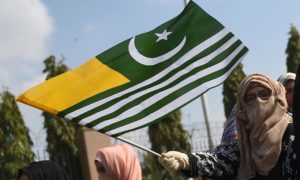
A protester waves Kashmiri flag as they march during a demonstration against India, in Karachi on February 4, 2020. – Pakistan will observe Kashmir Solidarity Day on February 5, to express solidarity with their fellow Kashmiri’s living in Indian administered Kashmir. (Photo by Rizwan TABASSUM / AFP)
In this scenario, the least the world community owes them is justice, by granting them their right to self –determination by addressing the conflict. It needs to be understood that it is not simply a bilateral conflict between Pakistan and India. It is a struggle to honor the lives of innocent Kashmiri people, a recourse necessary for establishing the primacy of humanity. By refusing to acknowledge their resilient suffering, the notion of selective humanity, where the world regards some lives to be dearer than the others, is forcefully reiterated. With minds forever tainted, with hearts forever laden with harrowing tales of violence, Kashmiris deserve peace. They deserve a chance at life. It is high time we heard their call.

